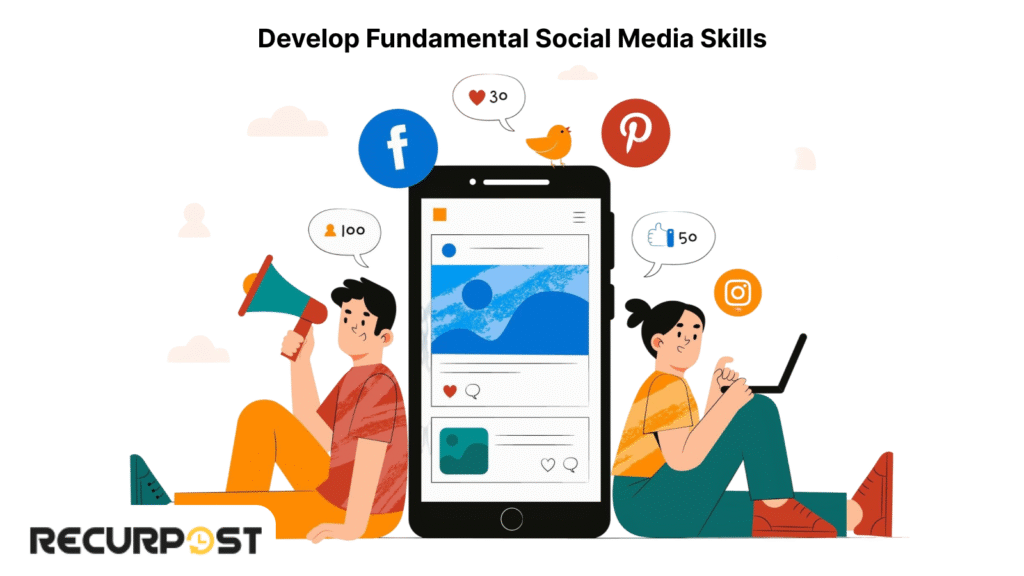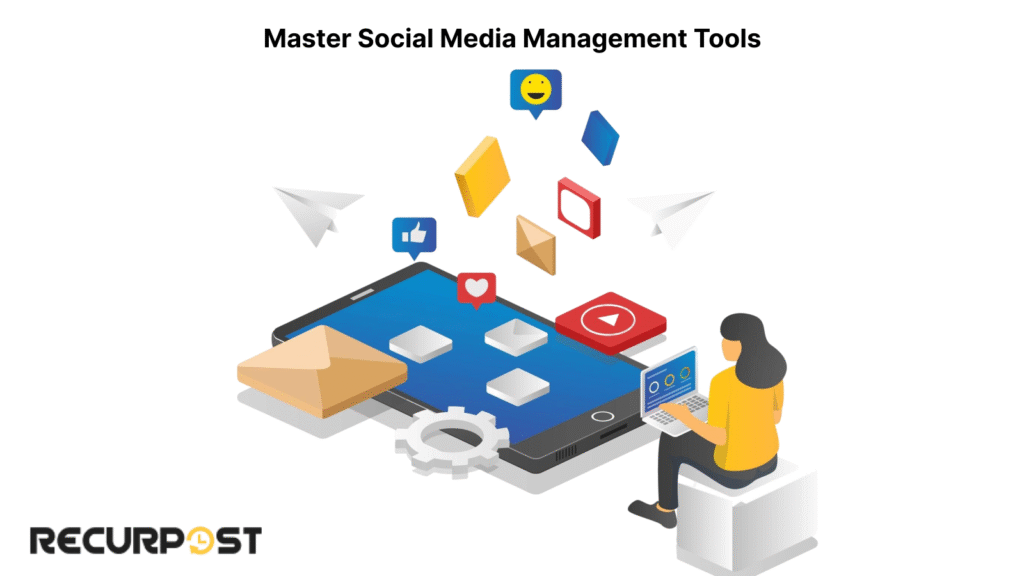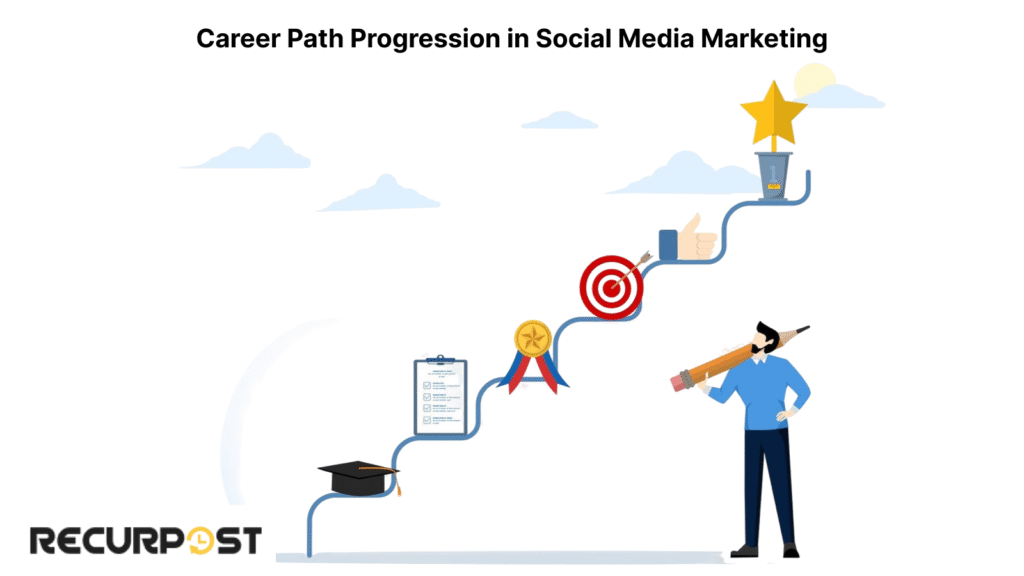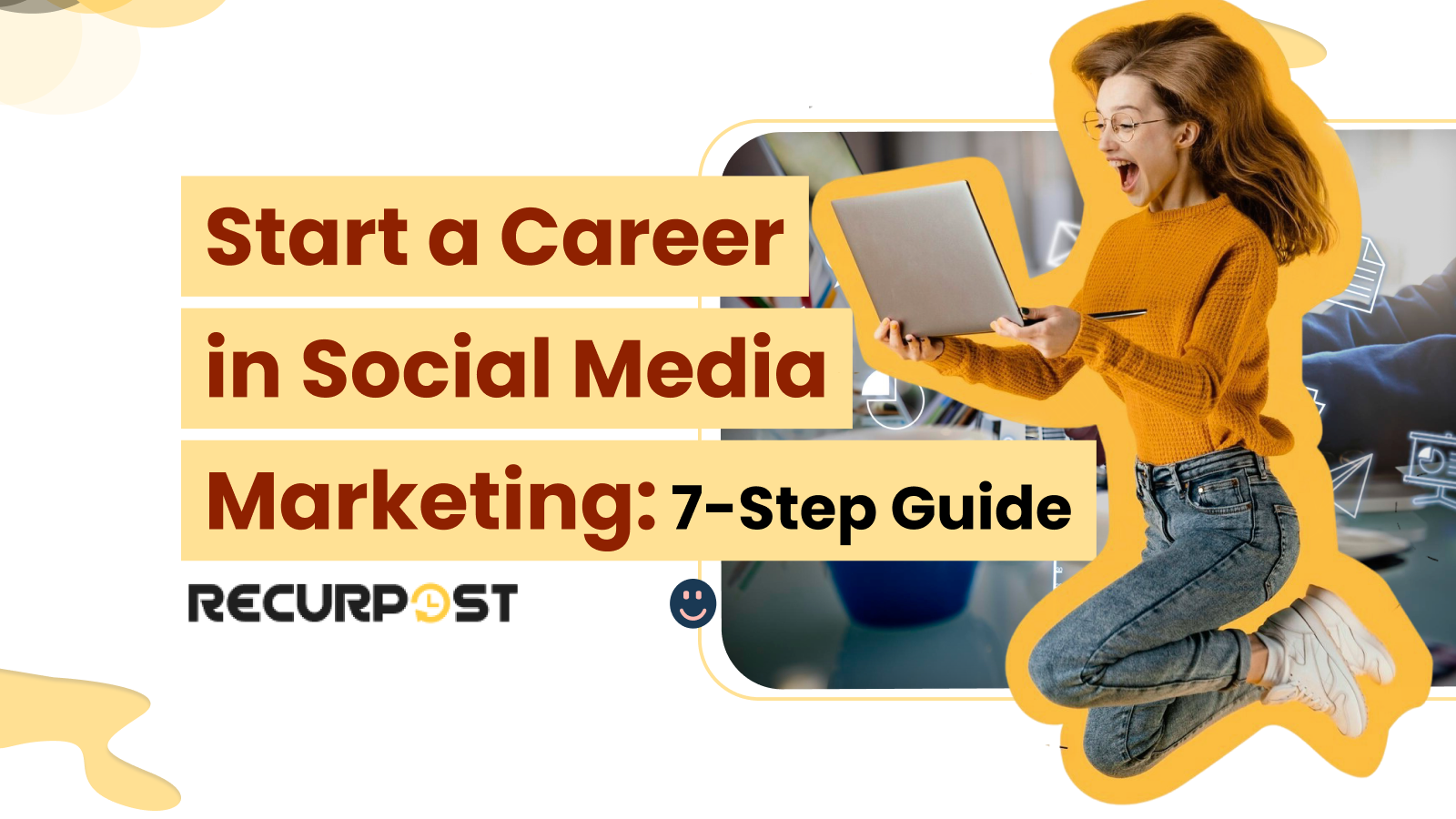Unlock Your Career in Social Media Marketing
Social media marketing isn’t just a passing trend; it’s a thriving career path. Whether you’re building a personal brand, working within a company, or managing campaigns for clients, a career in social media marketing opens up countless opportunities.
With 10% annual growth, a career in social media marketing offers entry-level pay between $35,000–$50,000 and opportunities across big agencies, small businesses, nonprofits, and freelancing. For beginners wondering how to get started in social media marketing, follow mentioned clear and achievable steps.
This guide covers developing necessary skills, gaining relevant experience, and networking effectively to secure your career in social media marketing.
The following seven actionable steps guide beginners toward starting a career in social media marketing:
Step 1: Develop Fundamental Social Media Skills

Starting a career in social media marketing requires hands-on platform experience. Practical abilities in content creation, management, and analysis differentiate successful marketers from others.
The fundamental skills for a smooth career in social media marketing include:
Essential Skills for Social Media Career Growth
- Content Creation & Curation: Every social media platform has its own vibe. You’ll need to know how to create content that fits each one. Whether it’s a fun TikTok video, a Facebook post with a call to action, or an Instagram carousel, you’ll need to learn how to engage users with relevant content. Practice making content daily to understand what works where!
- Graphic Design Basics: You don’t need to be a pro designer, but knowing tools like Canva or Adobe Express helps you create visuals that stand out. In a social media marketing career, this skill shows employers you can manage campaigns and design content that grabs attention.
- Copywriting: Crafting the right message is essential. Each platform has its own tone and style, so you’ll want to practice writing posts that align with the voice of each social media channel. Whether it’s short and snappy or detailed and informative, getting your writing right is key.
- Analytics: Every marketer needs to understand what’s working and what’s not. Learning how to track your campaigns using tools like Facebook Insights or Google Analytics is essential for measuring success. You’ll learn to optimize content and campaigns based on real-world data, which is one of the most important aspects of the job.
- SEO for Social Media: You might not be an SEO expert, but understanding how to make your posts more discoverable is a must. This means knowing how to use hashtags effectively, picking the right keywords, and optimizing your posts for better reach.
Practical Tip
Practicing these skills 2-3 hours daily for at least 90 days builds a strong foundation for a career in social media marketing. Create personal accounts, test various post types, and engage with audiences to learn platform mechanics.
Recommended Tools
- RecurPost: This tool helps you schedule content and track your social media campaigns. It’s perfect for beginners looking to understand content management systems. Not to mention, it saves you a lot of time!
Mastering these core skills lays the foundation for a successful career in social media marketing and prepares you for advanced roles and techniques.
Step 2: Obtain Relevant Education or Certification

After building foundational skills, strengthen your resume with social media marketing certifications or relevant education. Credentials show employers your commitment and combine theory with the hands-on experience you’ve gained for becoming a social media manager.
Why Relevant Social Media Marketing Education Matters
Certifications and courses show employers that you’re serious about building a career in social media marketing. They add proof of knowledge to your resume and make you stand out in a competitive social media marketing job market. Many employers prefer certifications over formal degrees in digital marketing. Most social media marketing certification programs offer affordability and online completion options.
Career-Boosting Certifications
- Digital Marketing Certificates: Programs like Google Digital Garage or HubSpot Academy offer free or low-cost courses that cover everything from SEO to content marketing. These are perfect if you want a broad understanding of the marketing world, including social media.
- Platform-specific certifications: If you want to show off your expertise on a particular platform, Facebook Blueprint and Twitter Flight School are great options. These will teach you how to use each platform’s ad tools, analytics, and best practices for engaging users.
- Marketing Analytics Courses: Social media marketers need to be able to read data. Learning how to measure the success of your campaigns and make data-driven decisions is crucial. You could explore platforms like Google Analytics Academy for free courses.
- Content Marketing Specializations: For a smooth career in social media marketing, one also requires knowledge of content strategy. Completing courses related to content creation, distribution, and measurement will boost your credibility.
Money and Time Commitment
- Most certifications cost between $200 and $1,000 and take about 20–40 hours to finish. If you’re just starting your career in social media marketing, you can also begin with free courses to build knowledge without spending money up front.
Practical Tip
If you’re starting on a tight budget, free resources for learning social media marketing, like Google’s Digital Garage or HubSpot Academy are great entry points. After completing those, moving on to paid certifications builds advanced skills and shows employers you’re ready for career-level opportunities in social media marketing.
Getting certified gives you an extra push in your social media marketing career and shows employers that you have real knowledge to back up your skills.
Step 3: Build a Professional Portfolio

Your portfolio showcases your capabilities to potential employers despite limited professional experience. This personal marketing highlight reel distinguishes candidates in competitive job markets.
Why Social Media Marketing Portfolio Matters
A portfolio shows employers that your social media marketing skills go beyond theory and prove you can apply your certifications in real-world projects. It’s also a way to prove you’re creative, organized, and capable of managing real-world social media campaigns.
Career Ready Social Media Marketing Portfolio Items
- Sample Campaigns: Develop 10-15 sample social media campaigns that cover different social media platforms and objectives. You can create these mock campaigns based on imaginary clients or even real businesses (with permission, of course). The goal is to show that you can come up with ideas and execute them. Show off your creativity, whether it’s a TikTok video, Instagram stories, or a Twitter thread.
- Content Calendars & Strategy Docs: Show how you would organize and schedule content over time. A content calendar is a great way to demonstrate that you understand the importance of consistency and planning. Strategy docs can highlight your approach to content creation, audience engagement, and goal setting.
- Mock Analytics Reports: Employers want to see that you can not only create content but also analyze its performance. Include some mock reports that show you know how to track key performance indicators (KPIs), like engagement rates, impressions, and conversions.
- Visual & Written Content: To grow your career in social media marketing, your portfolio should highlight both copywriting and design skills. Include written posts, blog snippets, and visual content such as infographics, memes, or video clips you’ve created.
Social Media Marketing Portfolio Layout Tips
- Categorize by Platform: If you’ve worked on campaigns across multiple platforms (like Facebook, Instagram, LinkedIn, etc.), organize your portfolio by platform type. This will show that you can tailor content to fit different platforms’ audiences and features.
- Categorize by Campaign Type: Alternatively, you can organize by campaign objectives: branding, lead generation, product launch, etc. This approach can help highlight your versatility as a social media marketer.
- Categorize by Industry: If you’ve worked on campaigns in different industries (fashion, real estate, education, etc.), grouping your work by industry can show that you understand the unique needs and audiences within each sector.
Digital Portfolio Platforms
Not sure where to host your social media marketing portfolio? These platforms make it easy to showcase your work to employers and clients:
- Behance: A platform specifically for creative professionals. It’s great for showcasing visual work and attracting attention from agencies and brands.
- LinkedIn: You can upload portfolio pieces directly to your LinkedIn profile and link to them from your job descriptions. It’s a great way to keep everything in one professional space.
- Personal Website: If you’re serious about making a strong impression, consider building a personal website using platforms like Wix or WordPress. This gives you more control over how your social media marketing works is displayed.
Practical Tip
Spend 4–6 weeks building your social media marketing portfolio. Begin with the basics, then keep adding projects as you gain more experience to show steady career growth in social media marketing. Ask for feedback from mentors, peers, or industry professionals. Their input helps you refine your skills and progress faster in your social media marketing career.
Your portfolio is a powerful tool that can set you apart when applying for social media marketing jobs. It’s the perfect way to show you’re ready to take on a career in social media marketing.
Step 4: Gain Practical Social Media Marketing Experience

Hands-on experience sets candidates apart, showing they can apply social media marketing skills and portfolios in real-world situations. Full-time employment isn’t necessary to gain hands-on experience when starting a career in social media marketing.
Why Gaining Practical Social Media Marketing Experience Matters
Practical experience is vital for a career in social media marketing, showing employers real-world knowledge while building confidence in daily campaign management and expanding your portfolio.
Ways to Gain Experience
- Volunteering: Nonprofits and small businesses are often looking for help with their social media, but might not have the budget for a professional. VolunteerMatch connects marketers with over 45,000 nonprofits that are in need of social media support. This is a great way to gain practical experience while giving back to your community.
- Freelancing: Freelancing is a great way to take on small projects and build your portfolio.Take projects for friends, local businesses, or through platforms like Upwork and Fiverr to grow your portfolio and gain real experience.
- Internships: Internships (paid or unpaid) can provide valuable experience and networking opportunities. Many companies are willing to take on interns looking to get into a career in social media marketing because they are looking for fresh perspectives and new ideas. Even unpaid internships count as legitimate experience that can boost your resume.
- Personal Projects: Managing your own social media accounts around a passion, whether a niche hobby, personal brand, or themed page, provides real experience in growing followers and creating content, all of which strengthens your career in social media marketing.
- Social Media Contests: Some companies host social media challenges or contests that you can participate in. These offer the chance to showcase your skills in a public way and may even lead to collaboration opportunities.
Freelance Sites to Start Your Career
- Upwork: A platform that connects freelancers with clients across various industries. You can set your rates and choose social media marketing projects that match your skill level.
- Fiverr: A more budget-friendly platform where you can offer specific services (like creating social media posts or writing captions) at a fixed price. It’s a great place to build a client base when you’re just starting.
Practical Tip
Start small; even unpaid projects can build experience and strengthen your social media marketing portfolio. Whether it’s offering your services to a local business, volunteering for a cause you care about, or managing a personal social media account, every bit of experience adds value to your portfolio. Over time, you’ll start to get paid gigs and build a reputation in the industry.
The experience you gain strengthens your portfolio and builds confidence for bigger social media marketing projects ahead.
Step 5: Network with Industry Professionals

A career in Social media marketing benefits from professional connections alongside knowledge. Networking connects you with mentors, expands your knowledge, and opens opportunities that can lead to roles in social media marketing.
Why Networking Matters in Social Media Jobs
Most opportunities for a career in social media marketing come through referrals and professional connections rather than job postings. Networking opens hidden markets, connects you with mentors, and builds industry knowledge, greatly increasing your chances of landing social media roles.
Where to Network
- LinkedIn: It is your professional hub for building a career in social media marketing. Join marketing-focused groups, engage actively with posts, and share your take on industry trends or even your own campaign wins. By contributing valuable insights, you position yourself as a knowledgeable professional in the field.
- Industry Events: Conferences, webinars, and meetups are perfect places to meet professionals in the field. Whether in person or online, these events allow you to learn from others, ask questions, and network with people who can offer advice or even help you land your first job. Many events also feature job boards or hiring announcements.
- Social Media Platforms: Don’t underestimate the power of Twitter chats, LinkedIn discussions, or even Facebook groups dedicated to social media marketers. Join conversations, ask questions, and share your work. You never know who might be looking for someone with your skills.
Networking Tips
- Set a Goal: Aim to connect with at least 5 new professionals each week. Whether it’s through LinkedIn, Twitter, or other platforms, reaching out consistently will help you build a solid network over time.
- Engage Actively: Networking isn’t just about sending connection requests; it’s about engaging with others. Comment on posts, share insights, and ask questions. Active participation is the key to building meaningful relationships.
- Build Relationships: Networking works best when it’s mutual. Share resources, answer questions, or celebrate others’ work. Strong connections with peers and industry leaders can open doors in your social media marketing career.
Practical Tip
Seek out mentors in the industry who can share guidance and real-world insights to help shape your social media marketing career. A mentor can help you navigate the challenges of getting into a career in social media marketing, offer career advice, and introduce you to others in the industry.
The more you network, the more opportunities will come your way. Begin building those connections now, they can shape your future in social media marketing.
Step 6: Master Social Media Management Tools

With your foundational skills, portfolio, and network in place, it’s time to familiarize yourself with the tools that will help you manage your social media campaigns like a pro. Employers seek social media professionals who know how to use the right tools to streamline work and improve results.
Why Mastering Social Media Management Tools Matters
Social media marketing requires organization. Tools for scheduling posts and tracking analytics save time and increase efficiency. Being skilled with the right tools shows employers you’re ready for a social media marketing role.
Career Boosting Tools
- RecurPost: This tool is fantastic for scheduling content across various platforms. It allows you to automate posts, manage content calendars, and track performance. Plus, RecurPost has an incredible recurring scheduling feature that can save you 5-7 hours a week, which is a huge time-saver when you’re managing multiple accounts.
- Multi-Platform Support: RecurPost supports all the major platforms like Facebook, Instagram, LinkedIn, Twitter, Pinterest, and Google Business Profile. So whether you’re working with a client or running your own campaigns, you can manage everything in one place.
- Affordable Pricing: At just $15/month, it’s a cost-effective option for social media marketers looking to streamline their workflow without breaking the bank. Plus, the 14-day free trial gives you a chance to explore its features before committing.
- Analytics Tools: Social media marketing isn’t just about posting content; it’s about measuring performance. Tools like Google Analytics, Facebook Insights, and Twitter Analytics help you track metrics like engagement, reach, and conversions. Understanding these numbers is vital for tweaking your campaigns and improving performance over time.
- Design Tools: As a social media marketer, you’ll need to create eye-catching visuals to complement your posts. Tools like Canva and Adobe Express are perfect for beginners and help you design graphics for everything from social media posts to banners. If you want to take things up a notch, you can explore tools like Photoshop or Illustrator.
- Content Creation Apps: Platforms like InShot, Adobe Premiere Rush, and Final Cut Pro are excellent for creating high-quality videos. Video content is a massive part of social media marketing, so knowing how to create engaging, shareable videos will set you apart from the competition.
Practical Tip
Spend a few hours each week learning 3–4 of these social media marketing tools. Free trials and tutorials make it easier, and gaining proficiency shows employers you’re ready for a social media marketing career.. The more you practice, the more confident you’ll become, and soon you’ll be able to manage campaigns like a seasoned pro.
Once you’ve mastered these tools, you’ll be prepared to take the next step: landing entry-level roles and building your career in social media marketing.
Step 7: Apply for Entry-Level Positions

Once you’ve built skills, created a portfolio, gained experience, and learned the tools, it’s time to apply for entry-level positions and launch your career in social media marketing. Target roles that fit your career goals, tailor every application, and practice for interviews to stand out in social media marketing.
Job Titles to Look For
- Social Media Coordinator: You’ll manage content schedules, interact with audiences, and support campaigns across multiple platforms.
- Content Creator: A role focused on generating content (posts, videos, infographics) for social media.
- Digital Marketing Assistant: A more general role, but often includes social media management as a key responsibility.
- Community Manager: You’ll be in charge of building and maintaining online communities, responding to comments, and engaging with followers.
Job Application Tips
- Targeted Applications: Tailor your resume and cover letter for each role, showing how your skills, tools, and experience match the social media job.
- Prepare for Interviews: When you land that interview, make sure you’re ready to talk about social media marketing.
- Your social media strategies: Be prepared to explain your approach to content creation, audience engagement, and analytics.
- Tools you’ve used: Talk about your experience with platforms like RecurPost, Canva, and Google Analytics.
- Real-life examples: Share success stories from your portfolio or previous projects (even if they were volunteer gigs or personal projects).
- Your social media strategies: Be prepared to explain your approach to content creation, audience engagement, and analytics.
- Tools you’ve used: Talk about your experience with platforms like RecurPost, Canva, and Google Analytics.
- Real-life examples: Share success stories from your portfolio or previous projects (even if they were volunteer gigs or personal projects).
- Professional Social Presence: Employers will check your social media profiles, so make sure they reflect your professionalism and knowledge. Share relevant content, engage with industry leaders, and showcase your expertise through posts or articles.
- Job Board Success Rates: Approximately 64% of social media marketing roles are filled through LinkedIn, making it crucial to keep your profile updated when building a career in social media marketing. On average, applicants land 1–2 interviews for every 10–15 applications, so apply consistently and stay motivated, even if it takes a few tries.
- Geographic Salary Variations: Be aware of regional salary differences. For example, in New York City career in social media marketing offers salaries 15% higher than the national average. Understanding this will help you negotiate your salary and set realistic expectations.
Salary Expectations
In a career in social media marketing, entry-level salaries range from $35,000–$50,000. Mid-level roles pay around $55,000–$80,000, while senior directors and social media strategists can earn $90,000–$130,000, with higher ranges common in major cities.
Practical Tip
Set up job alerts on LinkedIn, Indeed, and other job boards to stay updated on new openings for a career in social media marketing. Apply as soon as social media marketing roles go live, and don’t hesitate to send a polite follow-up email after applying; it shows enthusiasm and keeps you top of mind.
By applying for entry-level positions and continuously improving your skills, you’re well on your way to securing a job and a steady career in social media marketing.
Path Progression of Career in Social Media Marketing

A career in Social media marketing evolves in clear stages:
- Entry-Level (0-2 years): Start as a social media coordinator or specialist, handling social media posts, engaging with audiences, and supporting campaigns.
- Mid-Level (3-5 years): As a social media manager, you’ll manage social media marketing campaigns, develop strategies, and analyze social media analytics.
- Senior-Level (5+ years): In senior roles like social media director or strategist, you’ll oversee the overall social media presence, manage a team, and align strategies with company goals.
- Timeline: Expect about 3-5 years to move from entry to mid-level, and another 3-5 years to reach senior roles.
Industry-Specific Career Opportunities

Roles for a career in Social media marketing differ across industries:
- Tech: Focus on community building and lead generation via social media platforms like LinkedIn.
- Fashion: Leverage influencer marketing and create content on Instagram and TikTok.
- Healthcare: Share educational content and patient success stories to build trust and show value in social media marketing roles.
- Nonprofit organizations: Share emotional content that encourages donations and raises awareness, showing your impact as a social media marketer.
- Agency vs. In-house: Agencies offer a variety of projects, while in-house roles allow for long-term focus on a single brand’s social media presence.
Understanding Influencer Marketing in Social Media Campaigns

Influencer marketing has become an essential tool for expanding reach on social media platforms. Partnering with the right influencers can elevate your social media marketing strategy; however, it’s essential to focus on authentic influencers who genuinely resonate with your target audience.
Choose influencers based on the platform and brand voice that align with your goals. Measure the impact through key performance indicators (KPIs) like engagement rates, clicks, and conversions to ensure the campaign’s success. Effective paid marketing with influencers can help boost brand identity and engage new audiences.
Mastering influencer marketing can be a powerful stepping stone for anyone pursuing a career in social media marketing. As this field expands, specialists who know how to work with influencers are becoming essential for running impactful digital campaigns
Freelance vs. Agency Work: Which Is Right for Your Career in Social Media Marketing?

Choosing between freelance work and an agency role depends on your personal brand and career goals. Freelancing gives you the flexibility to manage social media marketing campaigns for a variety of clients across different platforms. You set your rates, choose your projects, and build your digital marketing skills at your own pace.
On the other hand, working at an agency provides stability and the chance to collaborate with a marketing team on diverse social media management projects. It’s an opportunity to specialize in social media strategy while learning from social media marketing managers and analysts.
Whether freelancing or working in an agency, both paths can offer valuable experiences in managing social media channels, building community engagement, and driving marketing efforts. Both are great for your career in social media marketing.
Conclusion
These seven steps establish a foundation for a career in social media marketing through skill development, experience acquisition, certification, and professional networking.
The journey to getting into a career in social media marketing and landing your first job might take anywhere from 6 to 12 months, depending on how much time and effort you dedicate to learning and applying what you’ve learned. With consistency and persistence, you’ll be on your way to becoming a skilled social media marketer.
Here’s a quick recap of the steps to begin a career in social media marketing:
- Developed fundamental social media skills: You learned the basics of content creation, graphic design, copywriting, analytics, and SEO.
- Earned certifications: You’ve completed courses from trusted platforms that strengthen your resume and set you apart in social media marketing
- Built a professional portfolio: You created mock campaigns, content calendars, and visual content to showcase your work.
- Gained practical experience: You volunteered, freelanced, or worked on personal projects to get hands-on experience.
- Networked with industry professionals: You connected with others in the industry to build relationships and learn from their experiences.
- Mastered social media management tools: You’ve become familiar with the tools that make your social media efforts more efficient.
- Applied for entry-level positions: You’re ready to start applying for jobs and securing your career in social media marketing!
Next Steps:
- Keep learning: Social media marketing continuously evolves, revealing new aspects for a career in social media marketing; hence, stay updated on current trends and tools.
- Keep building connections: The more professionals you know, the more opportunities you’ll have.
- Keep practicing: The more you manage campaigns, create content, and analyze results, the better you’ll get.
With dedication and the right attitude, you’ll soon find yourself working in this field. Celebrate small wins each step moves you closer to your career goals in social media marketing. Your career in social media marketing is just getting started!
FAQs on a Career in Social Media Marketing
1. How long does it take to build a career in social media marketing?
Building a career in social media marketing typically takes 6 to 12 months to build the necessary skills and secure your first position. The timeline depends on how much time you commit to learning and building experience in social media marketing.
2. Do I need a degree to start a career in social media marketing?
For a career in social media marketing, most employers often value certifications and hands-on experience more than formal degrees. Still, a degree in marketing, communications, or business can be helpful.
3. What should I add to my social media marketing portfolio?
Your portfolio should include a mix of mock campaigns, content calendars, analytics reports, and various types of content (written, visual, and video). A diverse portfolio shows employers the full range of your social media marketing skills.
4. How do I stay updated with social media trends?
Staying updated with social media trends is vital for growing your career in social media marketing. Follow blogs like Social Media Examiner and Hootsuite Blog, and engage with industry leaders on LinkedIn and Twitter. Also, monitor social media platforms like Instagram and TikTok for updates. Participating in social media marketing forums and webinars is another great way to stay current.
5. How can I use paid advertising to boost my social media campaigns?
Paid ads on platforms like Facebook, Instagram, and LinkedIn help you reach your target audience more effectively. Set clear goals, like brand awareness or lead generation, and optimize your ad spend. Use social media marketing tools to track performance and adjust your campaigns for better results.
6. How do I balance organic social media efforts and paid ads?
Organic social media content helps build relationships and engagement, while paid ads expand your reach. Use social media management tools to track both efforts and adjust your approach. Focus on community building with organic content and boost reach with paid ads for optimal social media marketing goals.
7. How do I measure success in social media marketing?
Success is measured through metrics like engagement, reach, conversions, and followers. Use tools like Google Analytics and Instagram Insights to track progress. Regularly review these numbers to refine your social media marketing strategy and improve customer engagement.
8. What are some common mistakes to avoid when starting a career in social media marketing?
Avoid these mistakes for your career in social media marketing: skipping analytics, posting inconsistently, ignoring audience engagement, and neglecting ongoing learning.
9. What’s the difference between a Social Media Manager and a Social Media Strategist?
In a career in social media marketing, the role of a social media manager is to handle daily posting and engagement, while a strategist’s role is to plan and analyze to drive results.
10. Can I specialize in a particular social media platform?
Yes! Specializing in platforms like Instagram or TikTok can set you apart in a career in social media marketing. You could become a TikTok creator or Instagram specialist, helping brands reach targeted audiences. This kind of expertise attracts clients and employers seeking platform-specific talent.

As a passionate content writer, I love blending creativity with research to craft compelling narratives that inform, engage, and inspire. With a strong focus on user engagement and brand communication, I create content that resonates with the audience and drives meaningful interactions.





